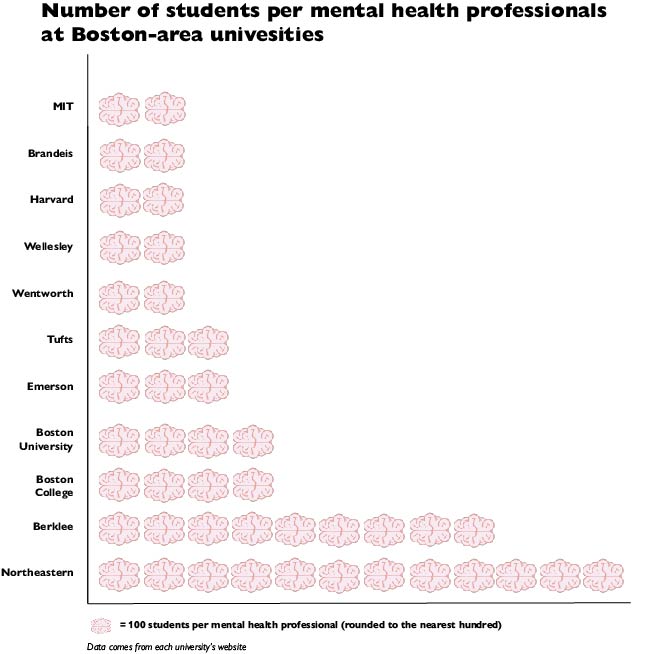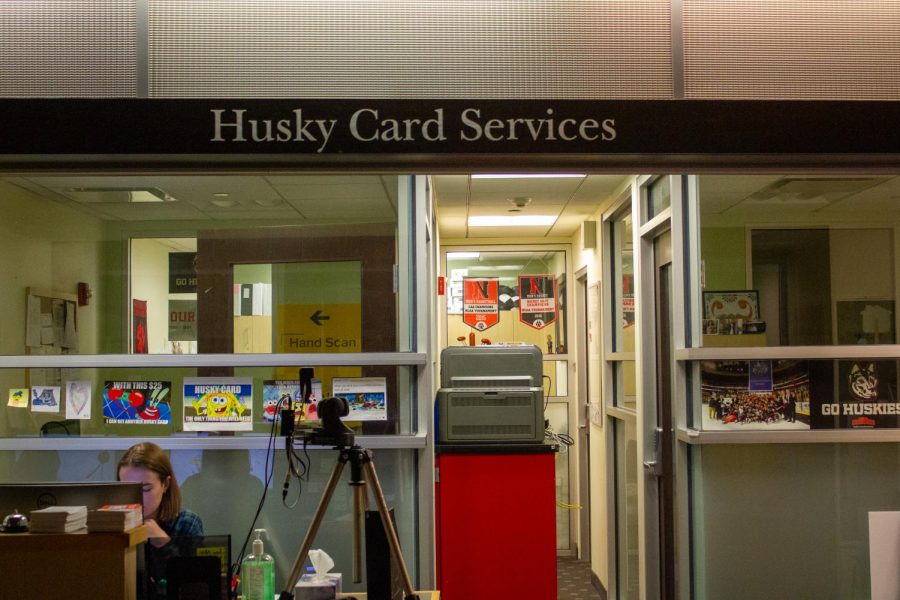Active Minds starts petition to add emergency numbers to Husky Cards
Students currently use Husky Cards to access residence halls, academic buildings and recreational facilities.
November 14, 2019
Over 700 people have signed a petition started by Active Minds at NU, a club that promotes mental health awareness, asking Northeastern to put the phone numbers for the Northeastern University Police Department, the National Suicide Prevention Hotline and the Boston Area Rape Crisis Center on the backs of new students’ Husky Cards.
This petition is part of a nationwide Active Minds campaign for colleges across the country to put emergency hotline numbers on students’ IDs. Active Minds at NU hopes this change will help students in crisis reach help faster and fill in some of the gaps in the university’s mental health services.
“We thought that this would be a good step in the right direction for Northeastern to start thinking more about mental health. It was a good campaign that was fairly well established for us to start moving forward with to do some on-campus advocacy,” said fifth-year biochemistry major Sarah Williams, co-president of Active Minds.
Active Minds leaders specifically chose the emergency numbers that they thought would be most helpful to the Northeastern community in times of crisis.
“As a student at Northeastern, your first contact in an emergency should be NUPD … but we know that for mental health topics or sexual assault topics, that NUPD may not be the first people that someone will want to speak to … If someone is contemplating taking their own life, the National Suicide Prevention hotline number is an amazing resource to reach out to,” Williams said.
Williams said she hopes the presence of the numbers will be comforting to students struggling with mental health issues.
“We are hoping that just by including that number on the back of Husky Cards, that students who aren’t in a great place with their mental health may see that number on the card and realize that there’s always someone available to talk to, there’s always someone they can reach out to if they feel like they need help,” Williams said.
Williams said the club felt that beyond mental health issues, sexual assault was also an area that needed to be addressed on IDs.
“Finally, with the Boston Area Rape Crisis [Center] number, we thought that that would be a great resource for students or faculty and staff who may have experienced a sexual assault and need a confidential resource to be able to call 24/7 in order to get the help that they need,” Williams said.
Students who support this initiative said going online to find these phone numbers might be too inconvenient in a time of emergency.
“All these resources are available online … but whenever I think of going online to find the NUPD number or any other numbers for resources that might be available, it seems like it might be a hassle to find or to determine exactly which one is the right one,” said Karthik Boyareddygari, a third-year physics and mathematics combined major and treasurer of Northeastern’s Sexual Assault Response Coalition. “If you just had clearly labeled numbers on Husky Cards that almost everyone carries around always, it seems like it would just make it much more convenient.”
Williams sees this petition as a way to help students during the ongoing national mental health crisis.
“There’s been a recent increase in the last decade or so in national suicides and rates of anxiety and depression and other mental health disorders. College students especially are struggling,” Williams said. “There’s a dire need to help these students, or just people in general, with mental health disorders, and we think that this may be one very small step that could at least impact some people that are considering taking their own life.”
Another reason Active Minds thinks it’s important to publicize these emergency numbers is that they believe Northeastern’s current infrastructure for dealing with student mental health falls short.
“I think that they do the best that they can with the money allotted, but I have heard various complaints about the [University Health and Counseling Services] at Northeastern, particularly long wait times, inability to find appointments, inability to find therapists through the referral system,” said Taylor Rose McDermott-Pinch, a fifth-year communication studies major and co-president of Active Minds.
“I think a lot of that problem is just stemming from a lack of funding. The university could, and should, spend more resources on mental health awareness and advocacy on campus,” she said.
One particular issue that students see is the lack of counselors available to speak with students.
“We have the worst amount of counselors per student of all the schools in the Boston area. SWAN, the Students Working for an Accessible Northeastern, published a graph of student-to-counselor ratios for Boston, and ours is staggeringly off to the right compared to everyone else’s. So [the university should] definitely [be] putting money into finding more counselors and into making students aware once they get those that UCHS is better now, that we gave more counselors, that we have counselors who can take you for longer,” McDermott-Pinch said.

Students do see the recent establishment of Find@Northeastern, a 24/7 mental health resource that students can access via a quick phone call, as a potentially positive sign.
“We do appreciate that it appears they’re trying. The new Find@Northeastern just came out, and obviously, it’s very new, so there’s not a lot of data on if it’s actually happening. But it’s definitely a step in the right direction,” McDermott-Pinch said.
Supporters of the petition hope that, even if nothing else changes, this small tweak to Husky Cards may have a big impact.
“[I signed] because when I saw the petition, I thought, if we have all this space on the back of the card, why not use it for something that could potentially help someone who needs it? If you put a helpline on it, someone who’s having a hard time, they’re probably not going to look it up online, but they’re always going to be looking at their card,” said Ellazan Gregg, a first-year international affairs and political science combined major.
Amaura Kemmerer, associate dean for wellness and director at the Office of Prevention and Education, said the university is open to the idea of putting emergency numbers on Husky Cards.
“We think it is a great idea and we would be happy to work with students in a way that looked at how we could do that,” Kemmerer said. “I think we would obviously make sure it was done in a way where it was relevant for students in any location … but it’s definitely something we are excited and willing to do with Active Minds.”
Taylor Driscoll contributed to this article.







